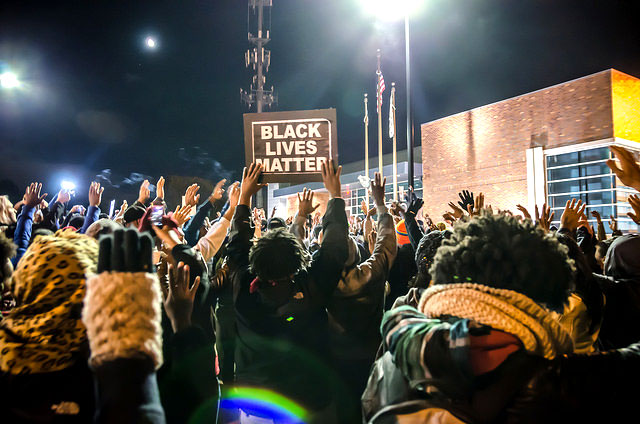
In one night, for many in this country, the world seemed to turn upside down. With the spectacle of Trump’s victory, the unimaginable morphed into an unrecognizable reality. The vindication of nationalist rage against “the establishment” — what Trump called his “movement” — looked like a cruel perversion of democracy, a “populist” victory built on the destruction of people power.
But for people who were never enfranchised, or who always existed in a state of liminal second-class citizenship, November 9 was just another day. They didn’t have the privilege of feeling like their voice at the ballot box had been silenced. For many, their very humanity had been denied the minute they set foot on American soil. A sense of profound alienation was familiar territory those who by law never had the vote, who didn’t awake to a nation they “no longer recognized,” so much as to a country that never recognized them.
It is ironic, yet perfectly fitting, that so much of this election centered on excluding others from the democratic process. Fitting because Trump’s win was secured through the systematic exclusion of key groups who have throughout history been denied the franchise: the rollback of voting rights and backlash against Black Lives Matter were not just irrational spasms of white anxiety but systematic assaults on the hard-fought gains of the civil rights movement. Those rights, too, were won a century late — in an effort to redeem the promise of the Fourteenth Amendment, which had to be added to the Constitution simply to affirm the citizenship of the formerly enslaved. And even with the past voting protections in place, huge swaths of the population were effectively disenfranchised by the criminal justice system.
Winning the vote based on the desire to deny future citizenship to undocumented immigrants perfectly encapsulates both why and how Trump triumphed. People exercised democracy in order to deny it to others — a zero-sum economy of political power that has driven politics since the nation’s founding.
And amid the chants about Building the Wall and banning Muslims, a more subtle war on indigenous rights was at work. As the backlash against fossil fuel regulation found a voice in Trump’s rhetoric, indigenous Americans struggled to stand their ground against dirty energy companies at Standing Rock and confronted the brazen brutality of colonization’s legacy as security forces cracked down on their demonstration.
Indigenous Americans were not considered citizens until 1924. Even then, many tribal members rejected the legal status conferred on them by federal authorities, because their claim to America has always been about not citizenship but about sovereignty and nationhood on their own terms.
So for millions, the day after the election was just another day of feeling dispossessed in America. Their political reality has, of course, changed profoundly, but the prospects of a Trump America that terrified many voters during the campaign season has long been the America that untold millions already lived in; today, it’s just more miserable, more precarious, more violent.
Still, the people who were always excluded from the system know how to persevere under a government that denies their humanity.
Cesar Vargas of the Dream Action Coalition surveys the post-Trump political horizon and sees more, not less, space to mobilize and defend communities: “Trump can try to take DACA away from us. But he won’t take our away our spirit to fight for our families. Just as my mother demonstrated unwavering strength, we will not let fear defeat us.”
Already, immigrant advocates are organizing their communities, holding the ones they love close, steeling the defenses of so-called “sanctuary cities” against Trump’s threats to punish them for refusing to cooperate with federal immigration raids. Their fight for survival did not begin on election day but takes on new urgency now.
The battle for the White House was less about electing a president than about determining who gets to wield power. So the election didn’t recreate but reiterated and amplified the status quo, masked as a “change agent.” The super-empowered few have always militated against democracy and used the electoral process itself to further disempower the dispossessed — a constituency that, by the way, includes people who were seduced into voting for Trump.
And as always, the unrepresented know how to survive in a world that forces them into a constant state of existential crisis. America under Trump would do well to listen to those who must constantly fight to be heard.
For them, nothing worth fighting for was ever worth retreating over. That’s why, after election day as before, people will take to the streets to defend black life; declare themselves undocumented and unafraid; and stand united at Standing Rock. Since they have always known where they belong, their social and cultural enfranchisement need not be certified by law. Their citizenship remains without borders.
Dissent is a left magazine of politics and culture.
Join us in defending the truth before it’s too late
The future of independent journalism is uncertain, and the consequences of losing it are too grave to ignore. To ensure Truthout remains safe, strong, and free, we need to raise $27,000 in the next 24 hours. Every dollar raised goes directly toward the costs of producing news you can trust.
Please give what you can — because by supporting us with a tax-deductible donation, you’re not just preserving a source of news, you’re helping to safeguard what’s left of our democracy.